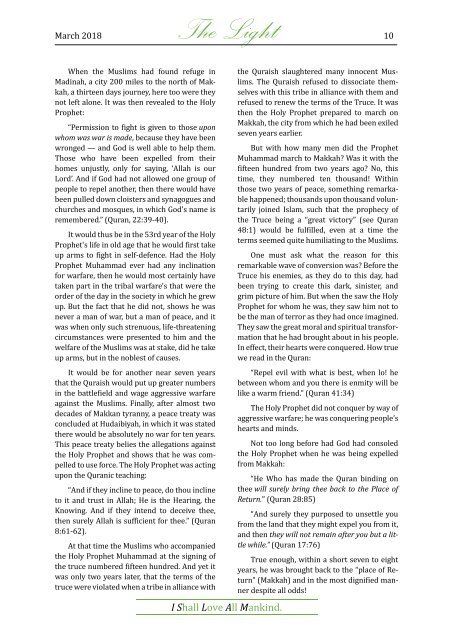The Light 2018 03 March issue
English organ of the Ahmadiyya Anjuman Ishaat Islam. Presenting Islam as taught by the Holy Prophet Muhammad (s) as a tolerant, peaceful, inclusive, loving, rational religion. To learn more go to www.virtualmosque.co.uk
English organ of the Ahmadiyya Anjuman Ishaat Islam. Presenting Islam as taught by the Holy Prophet Muhammad (s) as a tolerant, peaceful, inclusive, loving, rational religion. To learn more go to www.virtualmosque.co.uk
You also want an ePaper? Increase the reach of your titles
YUMPU automatically turns print PDFs into web optimized ePapers that Google loves.
<strong>March</strong> <strong>2018</strong> <strong>The</strong><br />
<strong>Light</strong> 10<br />
When the Muslims had found refuge in<br />
Madinah, a city 200 miles to the north of Makkah,<br />
a thirteen days journey, here too were they<br />
not left alone. It was then revealed to the Holy<br />
Prophet:<br />
“Permission to fight is given to those upon<br />
whom was war is made, because they have been<br />
wronged — and God is well able to help them.<br />
Those who have been expelled from their<br />
homes unjustly, only for saying, ‘Allah is our<br />
Lord’. And if God had not allowed one group of<br />
people to repel another, then there would have<br />
been pulled down cloisters and synagogues and<br />
churches and mosques, in which God's name is<br />
remembered.” (Quran, 22:39-40).<br />
It would thus be in the 53rd year of the Holy<br />
Prophet's life in old age that he would first take<br />
up arms to fight in self-defence. Had the Holy<br />
Prophet Muhammad ever had any inclination<br />
for warfare, then he would most certainly have<br />
taken part in the tribal warfare's that were the<br />
order of the day in the society in which he grew<br />
up. But the fact that he did not, shows he was<br />
never a man of war, but a man of peace, and it<br />
was when only such strenuous, life-threatening<br />
circumstances were presented to him and the<br />
welfare of the Muslims was at stake, did he take<br />
up arms, but in the noblest of causes.<br />
It would be for another near seven years<br />
that the Quraish would put up greater numbers<br />
in the battlefield and wage aggressive warfare<br />
against the Muslims. Finally, after almost two<br />
decades of Makkan tyranny, a peace treaty was<br />
concluded at Hudaibiyah, in which it was stated<br />
there would be absolutely no war for ten years.<br />
This peace treaty belies the allegations against<br />
the Holy Prophet and shows that he was compelled<br />
to use force. <strong>The</strong> Holy Prophet was acting<br />
upon the Quranic teaching:<br />
“And if they incline to peace, do thou incline<br />
to it and trust in Allah; He is the Hearing, the<br />
Knowing. And if they intend to deceive thee,<br />
then surely Allah is sufficient for thee.” (Quran<br />
8:61-62).<br />
At that time the Muslims who accompanied<br />
the Holy Prophet Muhammad at the signing of<br />
the truce numbered fifteen hundred. And yet it<br />
was only two years later, that the terms of the<br />
truce were violated when a tribe in alliance with<br />
I Shall Love All Mankind.<br />
the Quraish slaughtered many innocent Muslims.<br />
<strong>The</strong> Quraish refused to dissociate themselves<br />
with this tribe in alliance with them and<br />
refused to renew the terms of the Truce. It was<br />
then the Holy Prophet prepared to march on<br />
Makkah, the city from which he had been exiled<br />
seven years earlier.<br />
But with how many men did the Prophet<br />
Muhammad march to Makkah? Was it with the<br />
fifteen hundred from two years ago? No, this<br />
time, they numbered ten thousand! Within<br />
those two years of peace, something remarkable<br />
happened; thousands upon thousand voluntarily<br />
joined Islam, such that the prophecy of<br />
the Truce being a “great victory” (see Quran<br />
48:1) would be fulfilled, even at a time the<br />
terms seemed quite humiliating to the Muslims.<br />
One must ask what the reason for this<br />
remarkable wave of conversion was? Before the<br />
Truce his enemies, as they do to this day, had<br />
been trying to create this dark, sinister, and<br />
grim picture of him. But when the saw the Holy<br />
Prophet for whom he was, they saw him not to<br />
be the man of terror as they had once imagined.<br />
<strong>The</strong>y saw the great moral and spiritual transformation<br />
that he had brought about in his people.<br />
In effect, their hearts were conquered. How true<br />
we read in the Quran:<br />
“Repel evil with what is best, when lo! he<br />
between whom and you there is enmity will be<br />
like a warm friend.” (Quran 41:34)<br />
<strong>The</strong> Holy Prophet did not conquer by way of<br />
aggressive warfare; he was conquering people’s<br />
hearts and minds.<br />
Not too long before had God had consoled<br />
the Holy Prophet when he was being expelled<br />
from Makkah:<br />
“He Who has made the Quran binding on<br />
thee will surely bring thee back to the Place of<br />
Return.” (Quran 28:85)<br />
“And surely they purposed to unsettle you<br />
from the land that they might expel you from it,<br />
and then they will not remain after you but a little<br />
while.” (Quran 17:76)<br />
True enough, within a short seven to eight<br />
years, he was brought back to the “place of Return”<br />
(Makkah) and in the most dignified manner<br />
despite all odds!














